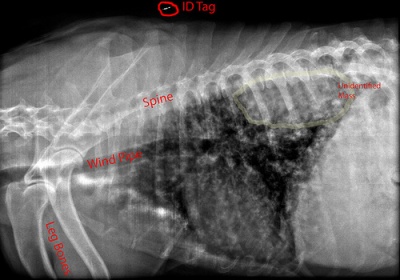
A cancer diagnosis in your pet can be extremely frightening. Companion animals live longer than they did in the past, so the number of pets contracting cancer has risen as well. At the same time, research into animal cancer has advanced, and many animals survive cancer and live a quality life. Early detection and proper treatment are key.
To learn more about cancer in pets, see:
- Bladder Cancer
- Cyberknife Treatments for Pets
- Definitions of Types of Cancer
- Diets for Pets with Cancer
- Long-Term Cancer Survivors and Their Stories
- Radiation Therapy for Pets
Below are articles relating to cancer in specific pets, as well as some inspirational stories of cancer survival.
Contents |
Cancer in Dogs
Cancer is the leading cause of death in dogs over the age of 10, although alarmingly, it has been diagnosed often in young dogs. But half of all cancers are curable if caught early. The warning signs of cancer in dogs are very similar to that in people: a lump or a bump, a wound that doesn’t heal, any kind of swelling, enlarged lymph nodes, a lameness or swelling in the bone, abnormal bleeding. In order to help prevent cancer, spay your dog. Your dog should have at least an annual checkup and be provided good dental care with proper diet and exercise. Cures for canine cancer are similar to cures for humans: surgery and radiation. There are a number of other options and protocols available.
Articles on canine cancer:.
- About Chemotherapy
- Another Weapon in the Cancer Battle
- Australia-Promising Canine Cancer Vaccine
- BPA Poisoning Our Pets
- Bladder Cancer
- Bone Cancer Dogs Funding OSA Trial
- Brain Cancer
- Brain Cancer Treatment for Dogs
- Cancer in Dogs
- Could This Be Another Weapon Against Cancer
- Feeding a Dog on Chemotherapy
- Listeria-based Vaccine for OSA
- Log of Timo’s Fight with Cancer
- Mast Cell Tumors (Mastocytomas)
- Microchips and Cancer
- New Blood Test Detects Canine Cancer
- New Study in Canine Osteosarcoma
- New Therapy for Canine Cancer
- Obesity in Dogs and Cancer Connection
- Ongoing Cancer Trials Give Hope
- Promising Treatment for Lymphoma
- Resiniferatoxin for Cancer
- What’s New in Cancer Treatment for Dogs
- What’s New in Cancer Treatments for Dogs: Page 2
Cancer in Cats
Cancer in cats is less common than cancer in dogs. It’s probably half the rate that we see in dogs, but tends to be more aggressive. It is also harder to detect, since cats try to mask illness. One of the most common cancers we see in cats is lymphoma, which is associated with the Feline Leukemia Virus (FeLV). Contraction of the virus can be prevented through vaccination. Lumps and bumps, vomiting and diarrhea, refusal to eat and weight loss, a rough coat and failure to thrive can all be symptoms of cancer. Purebred cats are no more likely to get cancer than mixed-breeds. Fewer than 50% of cats treated for cancer survive.
Articles on feline cancer:
Cancer in Other Pets
- About Chemotherapy
- Australia-Promising Canine Cancer Vaccine
- Basal Cell Tumors in Pets
- Brain Tumors in Pets
- Cancer in Birds
- Cancer in Ferrets
- Cancer in Horses
- Cancer in Rabbits
- Cancer in Small Pets
- Clinical Trial for Dogs with TCC
- Dr. Dressler and MCP for Cancer
- FDA -Recall of Some IV Chemo Drugs
- Journal of AVMA -New Study Administering Chemo for OSA
- Necessity of Biopsies
- Ongoing Cancer Trials Give Hope
- Overcoming Resistance to Chemo in Canine OSA
- Possible Link Between PBDEs and Thyroid Cancer
- Predicting Survival Times for Cancer
- Propolis-Hopeful Cancer Fighter
- Pros and Cons of Trials for Cancer
- Should Your Pet Undergo Chemotherapy
- Tail Vaccinations for Cats
- Treating Chemotherapy Side Effects
- U of Penn Vet School and Mushroom Study for Cancer
- Update on Spaying and Cancer
- VAS in Cats
Cancer Survivor Stories
- Survior Story: Birgit and Saboo
- Survior Story: Deb and Priscilla
- Survivor Story: Beth, Tom and Milo
- Survivor Story: Cheryl and Scitzo
- Survivor Story: Jeannie and Tank
- Survivor Story: Laurie and the Roopster Guiliani Lawson
- Survivor Story: Nicole and Daggit
- Survivor Story: Rhonda and Lance
- Survivor Story: Ruth and Bracken



